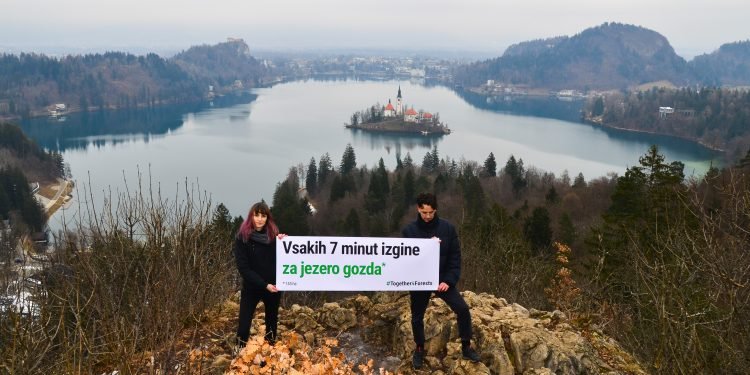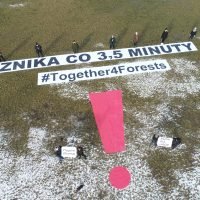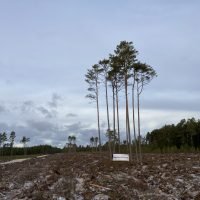Belgium, (Brussels Morning Newspaper) Activists in 14 EU countries have protested during the week gone by demanding urgent action to stop the rate at which the world is losing forests and calling on ministers to improve the EU’s upcoming anti-deforestation law.
The anti-deforestation law is expected to be on the agenda of the next meeting of EU environment ministers in Brussels, on 17 March, touted as one of the priorities of the ongoing French Presidency.
According to Greenpeace, the “Together For Forests” coalition is calling on national governments to curb the EU’s contribution to forest and ecosystem destruction, and to human rights violations around the world.
From Sweden to Romania, activists have been taking aerial photos to show how quickly the world’s forests are disappearing (an area the size of a football pitch every two seconds), which they claim is partly due to European consumption of products from the cleared areas.
To address the problem, activists are calling for products that can put ecosystems at risk — meat, soy, maize, rubber, wood and paper being examples — to be proven non-destructive of nature before they can be sold on the EU market.
“Europe makes an outsized contribution to this destruction through the consumption of many everyday products, but we have a real opportunity to end this complicity. Ministers must improve on the EU Commission’s plan and ensure that everything sold in the EU is free from forest and ecosystem destruction, and the human rights abuse that so often comes with it”, Greenpeace EU agriculture and forest campaigner Sini Eräjää maintained.
Indigenous Peoples
In a recent open letter published by the NGO Fern, Indigenous Peoples and local communities are also urging businesses to respect land rights as part of the EU regulation on deforestation-free products.
“Europe’s responsibility for dispossessing Indigenous Peoples and local communities of their land stretches back centuries, and post-colonial legal systems have never fully recognized their land rights”, Julia Christian, a forests campaigner at Ferns declared.
The environmental NGO, which is dedicated to the preservation of forests and rights, has also advocated that the EU ensure that the upcoming regulation protects those rights by adhering to international standards. Moreover, numerous studies reveal that Indigenous Peoples and local communities are nature’s best protectors, and that therefore those communities should receive greater protection.
“The crucial flaw in the EU’s proposal is it doesn’t compel businesses to uphold international standards in regard to our land rights”, Puyr Tembé, Executive Coordinator of the Pará State Federation of Indigenous Peoples (FEPIPA), complained.
“The world knows that the lack of protection for our rights has been a disaster for the Amazon and exposed Indigenous leaders to violence from cattle ranchers, loggers, and other invaders”, Tembé added.
According to Fern, Indigenous Peoples manage half of the world’s great forests, which store more carbon and have lower rates of deforestation and degradation compared to other areas.
However, around the world, the Indigenous Peoples and communities with customary tenure rights are dispossessed or denied rights to their land and subject to attack, threatened, and killed for defending their territories, often from business activities, according to Fern.









